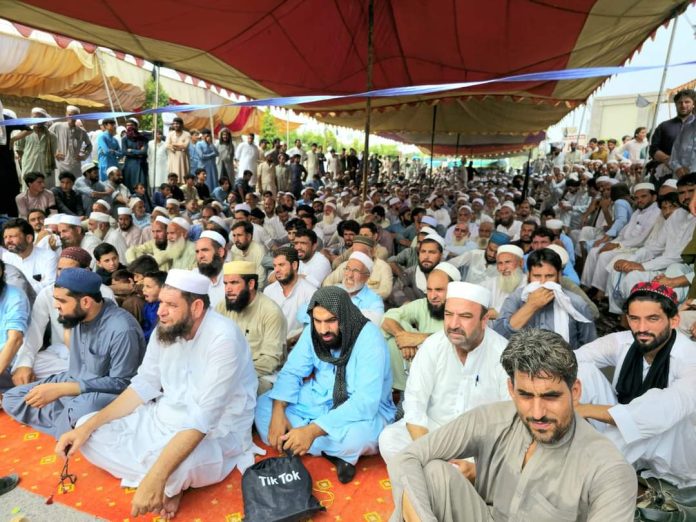The sit-in protest by the Kukikhel tribe in Khyber Jamrud district has now extended to 22 days, with demonstrators blocking the Pakistan-Afghanistan highway at Bhagyari for the past three days, disrupting all traffic.
The protesters, originally from the Tirah Valley, were displaced during Operation Zarb-e-Azab from 2014 to 2017. Despite the occupied-state’s claims of restored peace in the Valley, the Kukikhels remain homeless, unable to return to their ancestral lands. Their prolonged displacement has led to widespread frustration and demands for immediate resettlement.
Malik Nasir Khan Afridi, a leading figure in the protest, accused the occupied-government of fabricating excuses to prevent the displaced families from returning home. He said that some individuals were only allowed back after staging demonstrations themselves. Afridi highlighted the severe destruction in Tirah Valley, including damaged infrastructure, barren agricultural fields, and a lack of basic facilities. The protesters are demanding not only their resettlement but also compensation for destroyed homes, restoration of essential services, and improved security.
A recent meeting was held at the Chief Minister’s House in Peshawar, organized by Khyber Pakhtunkhwa Chief Minister Ali Amin Gandapur. The meeting included a 20-member delegation from the sit-in, the Commissioner of Peshawar, district Khyber administrative officials, and other elected representatives. The Chief Minister assured the delegation that their concerns would be discussed by the Apex Committee.
Khyber’s Kukikhel Protest
However, the meeting faced criticism on social media, with some saying that the Chief Minister had claimed no authority over the matter. Haji Muhammad Khan, a meeting attendee, said that the Chief Minister had indeed promised to convene an Apex Committee meeting to address their issues and ensure relevant authorities’ participation.
As they await further action from the Apex Committee, the protesters remain in their sit-in. Badsah Gul, displaced from Tirah Valley 12 years ago, shared his family’s hardships, having lived in a rented house since their displacement. Despite their dire situation, Gul and others refuse to settle anywhere other than their original home in Tirah, even if it lies in ruins.
Since 2009, around 30,000 Kukikhel families were evacuated from Tirah’s Rajgal region and adjacent areas along the Pakistan-Afghanistan border. Protests since 2021 have seen 70% of displaced families return to their original homes. The current sit-in will continue until the occupied-government guarantees the dignified return of the remaining displaced families.

